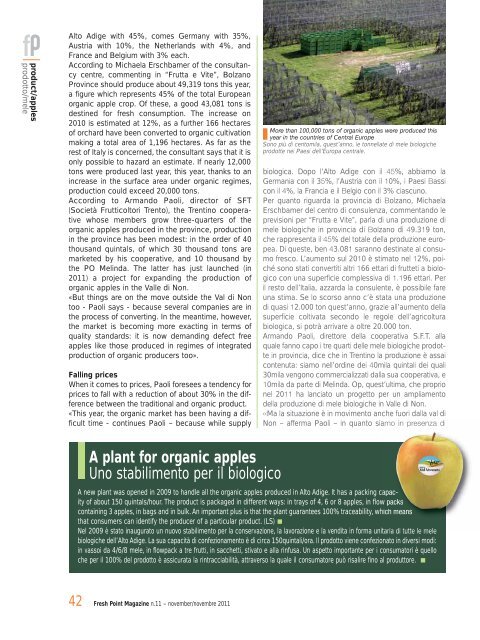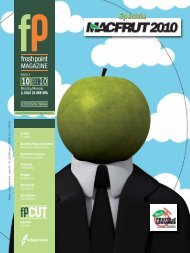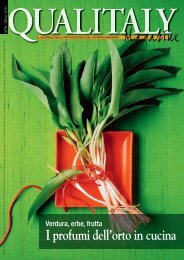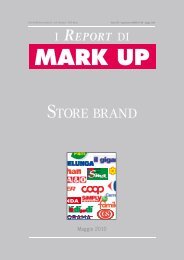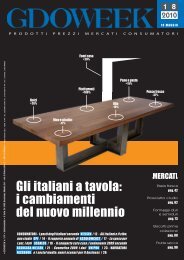Fresh Point Magazine - B2B24 - Il Sole 24 Ore
Fresh Point Magazine - B2B24 - Il Sole 24 Ore
Fresh Point Magazine - B2B24 - Il Sole 24 Ore
Create successful ePaper yourself
Turn your PDF publications into a flip-book with our unique Google optimized e-Paper software.
product/apples<br />
prodotto/mele<br />
Alto Adige with 45%, comes Germany with 35%,<br />
Austria with 10%, the Netherlands with 4%, and<br />
France and Belgium with 3% each.<br />
According to Michaela Erschbamer of the consultancy<br />
centre, commenting in “Frutta e Vite”, Bolzano<br />
Province should produce about 49,319 tons this year,<br />
a figure which represents 45% of the total European<br />
organic apple crop. Of these, a good 43,081 tons is<br />
destined for fresh consumption. The increase on<br />
2010 is estimated at 12%, as a further 166 hectares<br />
of orchard have been converted to organic cultivation<br />
making a total area of 1,196 hectares. As far as the<br />
rest of Italy is concerned, the consultant says that it is<br />
only possible to hazard an estimate. If nearly 12,000<br />
tons were produced last year, this year, thanks to an<br />
increase in the surface area under organic regimes,<br />
production could exceed 20,000 tons.<br />
According to Armando Paoli, director of SFT<br />
(Società Frutticoltori Trento), the Trentino cooperative<br />
whose members grow three-quarters of the<br />
organic apples produced in the province, production<br />
in the province has been modest: in the order of 40<br />
thousand quintals, of which 30 thousand tons are<br />
marketed by his cooperative, and 10 thousand by<br />
the PO Melinda. The latter has just launched (in<br />
2011) a project for expanding the production of<br />
organic apples in the Valle di Non.<br />
«But things are on the move outside the Val di Non<br />
too - Paoli says - because several companies are in<br />
the process of converting. In the meantime, however,<br />
the market is becoming more exacting in terms of<br />
quality standards: it is now demanding defect free<br />
apples like those produced in regimes of integrated<br />
production of organic producers too».<br />
Falling prices<br />
When it comes to prices, Paoli foresees a tendency for<br />
prices to fall with a reduction of about 30% in the difference<br />
between the traditional and organic product.<br />
«This year, the organic market has been having a difficult<br />
time - continues Paoli – because while supply<br />
A plant for organic apples<br />
Uno stabilimento per il biologico<br />
42 <strong>Fresh</strong> <strong>Point</strong> <strong>Magazine</strong> n.11 – november/novembre 2011<br />
More than 100,000 tons of organic apples were produced this<br />
year in the countries of Central Europe<br />
Sono più di centomila, quest’anno, le tonnellate di mele biologiche<br />
prodotte nei Paesi dell’Europa centrale.<br />
biologica. Dopo l’Alto Adige con il 45%, abbiamo la<br />
Germania con il 35%, l’Austria con il 10%, i Paesi Bassi<br />
con il 4%, la Francia e il Belgio con il 3% ciascuno.<br />
Per quanto riguarda la provincia di Bolzano, Michaela<br />
Erschbamer del centro di consulenza, commentando le<br />
previsioni per “Frutta e Vite”, parla di una produzione di<br />
mele biologiche in provincia di Bolzano di 49.319 ton,<br />
che rappresenta il 45% del totale della produzione europea.<br />
Di queste, ben 43.081 saranno destinate al consumo<br />
fresco. L’aumento sul 2010 è stimato nel 12%, poiché<br />
sono stati convertiti altri 166 ettari di frutteti a biologico<br />
con una superficie complessiva di 1.196 ettari. Per<br />
il resto dell’Italia, azzarda la consulente, è possibile fare<br />
una stima. Se lo scorso anno c’è stata una produzione<br />
di quasi 12.000 ton quest’anno, grazie all’aumento della<br />
superficie coltivata secondo le regole dell’agricoltura<br />
biologica, si potrà arrivare a oltre 20.000 ton.<br />
Armando Paoli, direttore della cooperativa S.F.T. alla<br />
quale fanno capo i tre quarti delle mele biologiche prodotte<br />
in provincia, dice che in Trentino la produzione è assai<br />
contenuta: siamo nell’ordine dei 40mila quintali dei quali<br />
30mila vengono commercializzati dalla sua cooperativa, e<br />
10mila da parte di Melinda. Op, quest’ultima, che proprio<br />
nel 2011 ha lanciato un progetto per un ampliamento<br />
della produzione di mele biologiche in Valle di Non.<br />
‹‹Ma la situazione è in movimento anche fuori dalla val di<br />
Non – afferma Paoli – in quanto siamo in presenza di<br />
A new plant was opened in 2009 to handle all the organic apples produced in Alto Adige. It has a packing capacity<br />
of about 150 quintals/hour. The product is packaged in different ways: in trays of 4, 6 or 8 apples, in flow packs<br />
containing 3 apples, in bags and in bulk. An important plus is that the plant guarantees 100% traceability, which means<br />
that consumers can identify the producer of a particular product. (LS)<br />
Nel 2009 è stato inaugurato un nuovo stabilimento per la conservazione, la lavorazione e la vendita in forma unitaria di tutte le mele<br />
biologiche dell’Alto Adige. La sua capacità di confezionamento è di circa 150quintali/ora. <strong>Il</strong> prodotto viene confezionato in diversi modi:<br />
in vassoi da 4/6/8 mele, in flowpack a tre frutti, in sacchetti, stivato e alla rinfusa. Un aspetto importante per i consumatori è quello<br />
che per il 100% del prodotto è assicurata la rintracciabilità, attraverso la quale il consumatore può risalire fino al produttore.


